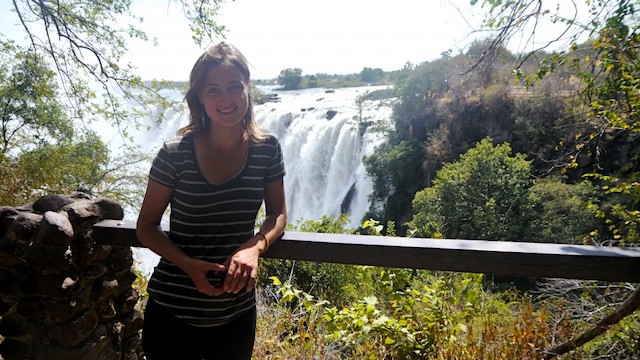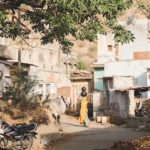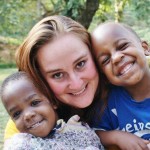Two Purple Shirts: Finding Home in Africa

Two years ago, when I visited Madaba, Jordan on a weekend trip from Amman, I stumbled across something that left me speechless. I saw a young Jordanian boy walking down the streets of the city with a South Eugene Axemen t-shirt–the t-shirt of my very own high school in Oregon.
I clearly recall the feelings of astonishment and confusion that consumed me as I processed what I had just witnessed. I gaped in astonishment and then ran up to the boy, yelling “I can’t believe it. That is my high school t-shirt! My high school t-shirt! MY HIGH SCHOOL T-SHIRT!!”
I vividly remember the jumble of emotions that followed and the voices of my friends as they called out, “Are you sure?”
What I don’t remember clearly are the seconds leading up to the moment when I found myself in the middle of the street, hugging the boy and asking if he would take a picture with me.
The only person more startled than me at that moment, was likely the young boy who all of a sudden found himself standing in the middle of the street, hugging an American girl as she kept repeating in broken Arabic, “I can’t believe it! Your shirt!”
Two Purple Shirts: Finding Home in Africa.
The discovery of my shirt in Amman happened at an interesting point in my life–at a point when I began to think a lot about the type of life I hope to live and the career path I would like to follow. It was at a period of time when I was beginning to discover my desire to do something meaningful, something that would have an impact on the lives of others around the globe. It was also, coincidentally, around the time when I had just finished reading a book by Jacqueline Novogratz called, The Blue Sweater.
In her book, Novogratz speaks of the challenges and rewards of working in international development and the series of events in her life leading up to her position as the founder of the Acumen Fund. She begins her memoir with an anecdote about her favorite sweater that she had received from her uncle as a Christmas gift when she was a child. She recounts the memories of donating the sweater to goodwill and the pain of parting with her favorite article of clothing.
It was not until years later, in the streets of Kigali, Rwanda, that Novogratz would reunite with her sweater. While on a work assignment in the capital of the tiny, landlocked nation, she saw a young boy wearing her beloved sweater. This discovery would begin to make her realize the complex web of connections between people around the globe and fueled her desire to act as a catalyst of change.
During the past few months in Africa, as I have lived, worked and traveled overseas, I have kept thinking about Novogratz’s story as a young woman with dreams and aspirations and I see how her own life is reflected in mine.
Yet, it is not only my job here in Namibia that has led me to think about the trajectory of her life.
Yet, it is not only my job here in Namibia that has led me to think about the trajectory of her life. It is also the fact that wherever I go, I am constantly reminded of how connected we all are–of how the degrees of separation between people around the world are, in fact quite small and that one seemingly unimportant decision or action can have repercussions in the most unexpected places.
Never in my life, had I been more aware of the interconnectivity of our world than during my month-long jaunt around southern Africa.
Throughout our journey, strange coincidences seemed to follow me at every destination. Wherever I went, I would meet people who knew friends or acquaintances of mine from America. My travel companions even ceased to be surprised when I told them that I had yet again spoken to someone who knew one of my friends from home.
And then, at a crowded arts festival in Harare, Zimbabwe, I unexpectedly ran into a fellow American I knew from University in the Midwest. I was stunned. In the middle of a festival in Harare, I saw someone from my tiny college campus thousands of miles away.
The feeling of seeing a familiar face in such an unfamiliar location is quite surreal, but it was not the first time I have had such an unexpected encounter in my travels. In fact, situations like this seem to pop up everywhere I go. A few years ago, when I was visiting the ancient city of Kairouan, in Central Tunisia, I even happened to see a girl from my Macalester Arabic class. I remember how startled we both were as we stood there, staring at each other and shrieking, in the middle of one of the world’s holiest mosques.
And in Malawi, merely three days after my encounter in Zimbabwe, I was taking a walk along the beach, when I saw someone wearing a familiar article of clothing.
I had gotten up early for a short walk and was enjoying the frenzy of activity along the lake shore.
I had gotten up early for a short walk and was enjoying the frenzy of activity along the lake shore. Cape Maclear is a beehive of activity and the waters of the lake are a gathering point for locals going about their daily activities. I walked slowly on the waters edge, stopping periodically to play with children, snap pictures of the translucent waters and greet the women washing clothes.
I was in the middle of greeting one woman when, all of a sudden, I froze. I could not believe my eyes when I saw what she was wearing. The embroidery on her purple and black tank top was unmistakable. She was wearing the uniform of the South Eugene high school rowing team. My rowing team. The one I had participated in for four years.
My mind raced back to my encounter with the Jordanian boy a few years prior and I was overcome with emotions, including an overwhelming sense of déjà vu.
The feeling of seeing someone wearing my crew team racing uniform is impossible to describe.
I am still not sure what these strange encounters and coincidences mean, or if they mean anything at all.
In my mind, however, they have come to symbolize a reaffirmation that what I have been doing for the past six months in Africa is indeed what I have been meant to do. Living, traveling and working abroad is where I am destined to be.
For, no matter where in the world I am, home always has a way of finding me.
Photo by Erika B.








